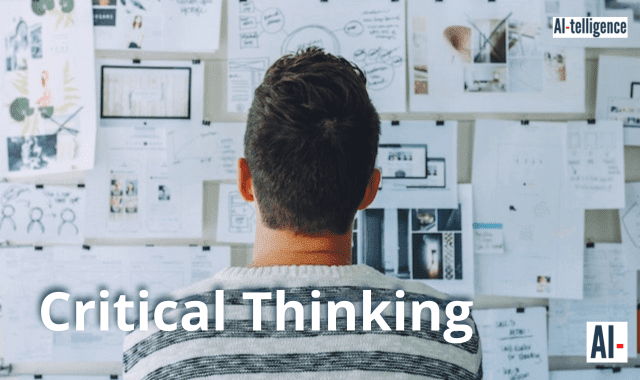How Critical Thinking Can Unlock the True Potential of Generative AI
 Critical Thinking |
How Critical Thinking Can Unlock the True Potential of Generative AI? Generative AI, also known as artificial intelligence that can create, is one of the most exciting advancements in technology today. It has the potential to revolutionize industries such as art, music, and fashion, and could even help solve complex problems in fields like medicine and science.
However, while AI has the ability to generate new ideas and solutions, it is still limited in its capabilities. This is where critical thinking comes into play.
Analyzing information, evaluating arguments, and making informed decisions are the essence of critical thinking. It is an essential skill for problem-solving and decision-making, and it is also crucial in the development of AI.
We will explore here the relationship between critical thinking and generative AI, and how the two can work together to unlock the true potential of this exciting technology.
The Relationship Between Critical Thinking and Generative AI:
At first glance, critical thinking and AI may seem like two entirely different concepts. However, the truth is that they are closely related. AI can be used to assist in critical thinking, and critical thinking can help AI develop and improve.
AI is used in critical thinking in a variety of ways. It can be used to gather and analyze large amounts of data, identify patterns and trends, and make predictions based on that data.
This can be particularly useful in fields such as finance and marketing, where companies need to make informed decisions based on consumer behavior and market trends.
On the other hand, critical thinking can help AI develop and improve in a number of ways. One of the most significant benefits of critical thinking for AI is the ability to identify biases and errors in algorithms.
This is particularly important when it comes to decision-making algorithms, which can have significant consequences if they are flawed or biased. By applying critical thinking skills to these algorithms, developers can ensure that they are fair, accurate, and reliable.
The Benefits of Critical Thinking for Generative AI:
There are several benefits to integrating critical thinking into generative AI. These are some of the most prominent:
- Improving accuracy and efficiency: By applying critical thinking skills to AI systems, developers can improve the accuracy and efficiency of these systems. They can identify and correct errors in algorithms, which can lead to more accurate predictions and outcomes.
- Promoting ethical considerations: As AI becomes more prevalent in our lives, it is essential to ensure that it is used in an ethical and responsible manner. Critical thinking can help developers identify potential ethical concerns and develop solutions that take these concerns into account.
- Enhancing creativity and innovation: AI has the potential to generate new ideas and solutions, but it is limited by its programming. By integrating critical thinking into AI development, developers can create systems that are more creative and innovative and can generate ideas that may not have been possible otherwise.
The Challenges of Integrating Critical Thinking into Generative AI:
While there are many benefits to integrating critical thinking into generative AI, there are also some significant challenges to consider. One of the biggest challenges is the limitations of current AI systems.
While AI has made significant advancements in recent years, it still has a long way to go before it can truly replicate human intelligence. This means that AI systems may not always be able to apply critical thinking skills in the same way that humans can.
Another challenge is the difficulty in programming critical thinking into AI systems. Critical thinking is a complex process that involves analyzing information, evaluating arguments, and making informed decisions. This is not an easy task to replicate in an AI system, particularly given the limitations of current AI technology.
Despite these challenges, there are many researchers and developers who are working on integrating critical thinking into generative AI systems. One approach is to develop AI systems that can learn from human decision-making and apply critical thinking skills based on that learning.
Another approach is to create AI systems that can evaluate their own decision-making and identify potential biases and errors.
Conclusion:
The integration of critical thinking into generative AI has the potential to unlock the true potential of this exciting technology. By applying critical thinking skills to AI development, developers can improve the accuracy and efficiency of AI systems, promote ethical considerations, and enhance creativity and innovation.
However, there are also significant challenges to consider, including the limitations of current AI systems and the difficulty in programming critical thinking into these systems. Despite these challenges, the future of generative AI with critical thinking looks bright, and we can expect to see many exciting advancements in this field in the years to come.
As we continue to develop and refine AI technology, it is essential that we balance technological advancements with critical thinking skills to ensure that AI is used in an ethical, responsible, and effective manner.

.png)
Comments
Post a Comment